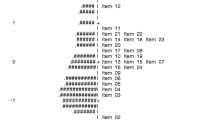Abstract
The study provides evidence concerning elementary school children’s ability to conduct a scientific investigation. Two hundred and fifty sixth-grade students and 248 fourth-grade students were administered a test, and based on their performance, they were classified into high-ability and low-ability students. The sample of this study was randomly selected and included 80 students, 40 fourth-grade and 40 sixth-grade students of low and high abilities. Students were specifically instructed to investigate the functioning of a device, to think aloud prior and after any experiment with the device, and to keep a record of their experimental results. The results showed that students were inclined to mainly collect evidence from the experimental space and failed to control variables during their investigation. The majority of the students had difficulties with effectively organizing collected data and failed to coordinate hypotheses with evidence. The significant interaction effect that was found between grade level and ability in terms of students’ investigation ability indicates that the existing gap between high- and low-ability students becomes bigger as students become older. Undoubtedly, ongoing research efforts for identifying patterns of children’s cognitive development will be most valuable as they can have important implications for the design of teaching scenarios and inquiry-based science activities conducive to accelerating students’ cognitive growth and scientific investigation abilities.




Similar content being viewed by others
References
Adey P (2005) Issues arising from the long-term evaluation of cognitive accelerating programs. Res Sci Educ 35:3–22
Brunken L, Plass JL, Leutner D (2003) Direct measurement of cognitive load in multimedia learning. Educ Psychol 38:53–61
Germann PJ, Aram RJ, Burke G (1996) Identifying patterns and relationships among the responses of seventh-grade students to the science process skill of designing experiments. J Res Sci Teach 33:79–99
Glaser BG, Strauss AL (1967) The discovery of grounded theory: strategies for qualitative research. Aldine Publications, Chicago, IL
Gleason ME, Schauble L (2000) Parents’ assistance of their children’s scientific reasoning. Cogn Instr 17:343–378
Gott R, Duggan S (1995) Investigative work in the science curriculum. Open University Press, Buckingham
Keselman A (2003) Supporting inquiry learning by promoting normative understanding of multivariate causality. J Res Sci Teach 40:898–921
Keys CW (1998) A study of grade six students generating questions and plans for open-ended science investigations. Res Sci Educ 28:301–316
Klahr D (2000) Exploring science: the cognition and development of discovery processes. MIT Press, Cambridge, MA
Klahr D, Dunbar K (1988) Dual space search during scientific reasoning. Cogn Sci 12:1–46
Klahr D, Dunbar K, Fay A (2000) Developmental aspects of scientific reasoning. In: Klahr D (ed) Exploring science: the cognition and development of discovery processes. MIT Press, Cambridge, MA
Klayman J, Ha YW (1987) Confirmation, disconfirmation and information in hypothesis testing. Psychol Rev 94:211–228
Kuhn D (1989) Children and adults as intuitive scientists. Psychol Rev 96:674–689
Kuhn D, Pearsall S (2000) Developmental origins of scientific thinking. J Cogn Dev 1:113–129
Kuhn D, Garcia-Mila M, Zohar A, Andersen C (1995) Strategies of knowledge acquisition. Monogr Soc Res Child Dev 60(40):1–128
Liu X, Lesniak KM (2005) Students’ progression of understanding the matter concept from elementary to high school. Sci Educ 89:433–450
McCloskey M (1983) Naïve theories of motion. In: Gentner D, Stevenns AL (eds) Mental models. Erlbaum Lawrence Associates, Hillsdale, NJ, pp 299–334
Mynatt CR, Doherty ME, Tweney RD (1978) Consequences of confirmation and disconfirmation in a simulated research environment. Q J Exp Psychol 30:395–406
Nakhleh MB, Samarapungavan A, Saglam Y (2005) Middle school students’ beliefs about matter. J Res Sci Teach 42:581–612
Piaget J, Inhelder B (1974) The child’s construction of quantities: conservation and atomism. Routledge & Kegan Paul, London
Schauble L (1990) Belief revision in children: the role of prior knowledge and strategies for generating evidence. J Exp Child Psychol 49:31–57
Schauble L (1996) The development of scientific reasoning in knowledge-rich contexts. Dev Psychol 32:102–119
Schauble L, Klopher LE, Raghavan K (1991) Students’ transition from an engineering model to a science model of experimentation. J Res Sci Teach 28:859–882
Schauble L, Glaser R, Duschl RA, Schulze S, John J (1995) Students’ understanding of the objectives and procedures of experimentation in the science classroom. J Learn Sci 4:131–166
Sharp JG, Kuerbis P (2006) Children’s ideas about the solar system and the chaos in learning science. Sci Educ 90:124–147
Strauss AL, Corbin J (1990) Basics of qualitative research: grounded theory procedures and techniques. Sage, Newbury Park, CA
Sweller J, van Merrienboer JJG, Paas F (1998) Cognitive architecture and instructional design. Educ Psychol Rev 10:251–296
Trafton JG, Trickett SB (2001) Note-taking for self-explanation and problem solving. Hum Comput Interact 16:1–38
Zimmerman C (2000) The development of scientific reasoning skills. Dev Rev 20:99–149
Zimmerman C (2007) The development of scientific thinking skills in elementary and middle school. Dev Rev 27:172–223
Author information
Authors and Affiliations
Corresponding author
Rights and permissions
About this article
Cite this article
Valanides, N., Papageorgiou, M. & Angeli, C. Scientific Investigations of Elementary School Children. J Sci Educ Technol 23, 26–36 (2014). https://doi.org/10.1007/s10956-013-9448-6
Published:
Issue Date:
DOI: https://doi.org/10.1007/s10956-013-9448-6




